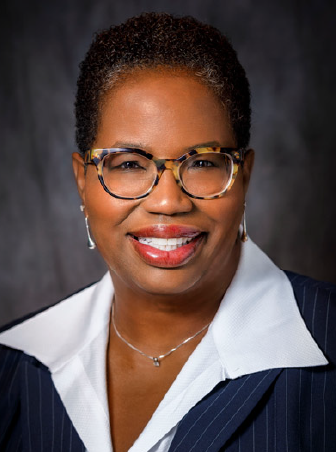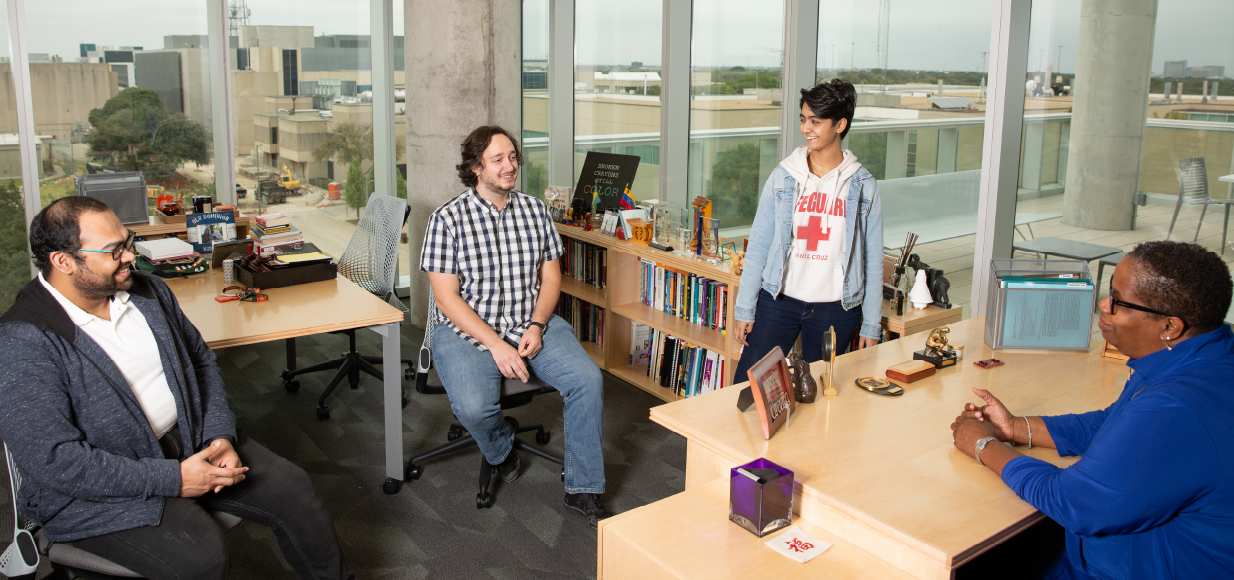Q&A with Dean Stephanie G. Adams
Dean Envisions the Next Phase

The trailblazing bent of Dr. Stephanie G. Adams, a pioneer of the study of teams in engineering education, led to her becoming the fifth dean of the Erik Jonsson School of Engineering and Computer Science, one of the fasting-growing schools in the country. We asked Adams, a professor of systems engineering, holder of the Lars Magnus Ericsson Chair and immediate past president of the American Society for Engineering Education, a few questions about her inaugural time at The University of Texas at Dallas.
You are a prolific traveler due to your numerous academic, professional and service positions. What is unique about UT Dallas?
Since joining, I have learned many things unique about UT Dallas. First is our strength in and commitment to innovation and entrepreneurship, which were goals established by our founders. Second, much like our founding corporate partner, Texas Instruments (TI), we maintain a commitment to corporate and community support based on mutual respect. It shows by the participation of state and local representatives in University events, along with the support from an owner of a professional Dallas sports team. We enjoy a very strong relationship with the Dallas community.
In addition to your responsibilities as dean, you have four active research projects with more than $1.4 million in research funding since starting at the University. How does your ongoing research activity impact the Jonsson School?
Yes, I do! My current projects focused on graduate student and faculty development, belonging, and intersectionality directly align with the Jonsson School’s and UTD’s strategic initiatives. Additionally, I am also applying the insights from this work to our organizational and programmatic changes at UT Dallas.

Several of your research projects have focused on creating welcoming and respectful cultures and you hosted a virtual dissertation writing seminar over the past summer to help students complete their PhDs. How does this work impact engineering on a national scale?
Our work most definitely extends beyond the Jonsson School. In 2020, particularly following protests not seen since the civil rights movement in the 1950s and 1960s, the issues of respect and belonging have become much more prominent in the national conversation. In the fields of engineering, computer science and mathematics, women, Black, Hispanic and Native American people simply are not represented according to their presence in the general population. There are many factors involved in a student’s path to completing a degree or in later achieving their potential in the workplace that extend beyond academics, from mentorship and overall organizational culture to access to resources. We have much more work to do, but by understanding the complexities of the student experience and providing nondiscriminatory environments, research shows that we truly help all students. These insights apply to an array of institutions.
The Jonsson School has ambitious plans to recruit a significant number of faculty members. Why should prospective candidates consider the Jonsson School?
For many of the same reasons I chose to come here: the vision of the institution. UT Dallas was conceptualized by the founders of TI to be cutting edge and prepare graduates to be competitive in the workforce: That mission and vision is still very much prevalent today. I’m a builder; I like to go to places where the picture is not quite in focus yet and you can contribute toward a masterpiece. If you enjoy building student-centric programs in the lab and the classroom and thrive on being surrounded by high-caliber students and peers, then the Jonsson School has a spot for you. And besides, it is cool here to be a geek. We do not have a football team: We give scholarships to chess masters.
Long before our current time in which systemic, worldwide issues are more openly discussed, you were known to pioneer pointed discussions about some topics that might make some people uncomfortable such as respect and accessibility in higher education. You also frequently pepper your presentations with quotes from prominent leaders. As the nation reexamines its ways and we are simultaneously experiencing a pandemic, from what comment do you draw inspiration?
There are actually two I would like to share: “Never doubt that a small group of thoughtful, committed citizens can change the world. Indeed, it’s the only thing that ever has,” Margaret Mead. And, “We can’t solve problems by using the same kind of thinking we used when we created them,” Albert Einstein.
Engineering Education Impact
You May Also Like
You May Also Like









